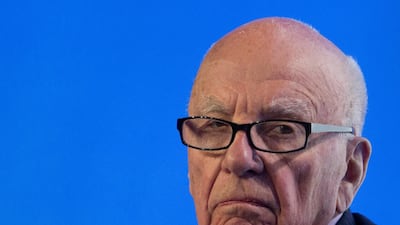Rupert Murdoch has spent his life acquiring things, building up his 21st Century Fox/News Corporation into the US$60 billion business it is today through a stunning series of acquisitions, which often stretched his business to the limit.
All his life, from the moment he inherited a couple of small newspapers in Adelaide, he has taken huge risks, betting the shop when he moved to the UK in the late 1960s with an outrageous bid for the News of the World. Then came Times Newspapers, followed by a move into the US, where he bought 20th Century Fox and a chain of TV stations before launching Fox TV, one of the most profitable – and influential - TV channels in the world today.
So the news in the past few days that he had been in negotiations - since broken off - to sell Fox's prime film and TV assets, including its 39 per cent stake in Sky, the pan-European broadcaster, to Walt Disney came as a shock to an industry which is already going through a deal frenzy as it battles to defend itself against the threat from the Silicon Valley giants, as well as declining audiences for traditional media. The Financial Times called it "the most tumultuous week" in recent memory but there is much more to come, with some huge deals hanging in the balance.
Nobody in the global media world attracts more interest and analysis than Mr Murdoch and the leak of his aborted – at least for the present – talks with Disney has set off a new wave of speculation among the army of journalists, writers and politicos who have followed his every move for decades. Why would he even consider breaking up the empire he has put together at such personal risk over more than 60 years? Is he throwing in the towel and acknowledging that, at 86, he can no longer compete in the world of modern media? Is technology moving too fast for an octogenarian, even with the help of much younger and tech-savvy children?
That is certainly the implication as details of the talks emerged. Fox’s movie and television studios and its cable entertainment business, which includes the National Geographic and FX channels, are worth an estimated $20bn between them, and Disney was also interested in buying Mr Murdoch’s international businesses, which include Star TV, the Asian pay-TV business, and the stake in Sky which has a value of about $9bn.
That would basically leave 21st Century with just its US sports channels and the Fox News service, which are highly profitable and seen – presumably by Mr Murdoch – as less vulnerable to the threats coming out of Silicon Valley. But for how long?
______________
Read more:
US, AT&T at odds over CNN in Time Warner deal
South Africa is in a mess and little hope remains
Thirty years after Black Monday, where are we now?
______________
He has been watching those threats for a long time but his reaction in the past has always been an aggressive one, such as his run on Time Warner three years ago, his most serious attempt to “bulk up” and stay ahead of - or least in - the game. The failure of his talks with Disney has sparked rumours that he might have another go, spoiling AT&T’s agreed $85.4bn deal which has already run into trouble. The US regulator last week required AT&T to sell off either its CNN news channel, scourge of Donald Trump, or DirecTV, its own satellite broadcaster, or the deal will not get approval.
Either way, Mr Murdoch has let his mask down and 21st Century Fox is now "in play". So is Disney, which also acknowledged its own vulnerability to Netflix, which it has been fighting tooth and nail. This is a real Hollywood versus Silicon Valley war with no holds barred. Disney's chief executive, Bob Iger, has already fired the opening salvo by announcing that as from January 2019 Disney's catalogue of hit movies, from The Jungle Book to the Toy Story franchise, will no longer be streamed on Netflix. That is a pretty serious decision: Disney, Fox and the other big studios have made billions of dollars from renting their shows to Netflix and Amazon Prime. The fact that they are now cutting that source off shows how concerned they are at the huge sums the streaming services are pumping into making their own content. Netflix alone has spent $130 million on making The Crown series and Amazon is said to have committed twice that to its own series, The Grand Tour. Millions of cable subscribers are cancelling their subscriptions, Fox's main income stream, forcing Disney to splash out $2.5bn on its own streaming service Bam Tech and launching some whizzy new apps.
But there is now talk that Disney itself may get a bid, possibly from Apple, which is also looking to get into the sector (and has an estimated $350bn sitting in cash in overseas accounts), or Amazon, and the cable giant Comcast is also said to be interested.
Compared to these monsters, 21st Century Fox is a minnow. Mr Murdoch’s last deal may be his best: cash in his chips while they are still on the table.

